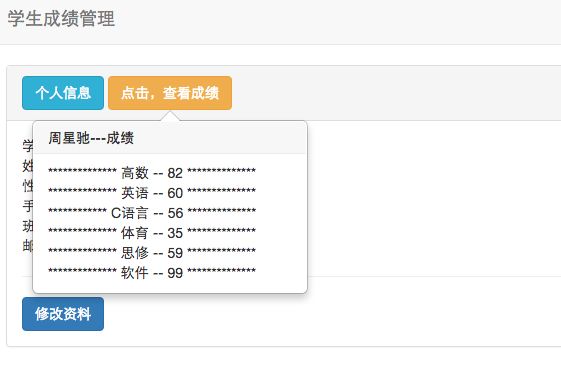Laravel5学生成绩管理系统-04-Eloquent关联
数据表之间经常会互相进行关联。例如,一篇博客文章可能会有多条评论,或是一张订单可能对应一个下单客户。Eloquent 让管理和处理这些关联变得很容易,同时也支持多种类型的关联:
一对一#
一对一关联是很基本的关联。例如一个 User 模型也许会对应一个 Phone。要定义这种关联,我们必须将 phone 方法放置于 User 模型上。phone 方法应该要返回基类 Eloquent 上的hasOne 方法的结果:
<?phpnamespace App;use Illuminate\Database\Eloquent\Model;class User extends Model{
/**
* 获取与指定用户互相关联的电话纪录。
*/
public function phone()
{
return $this->hasOne('App\Phone');
}}传到 hasOne 方法里的第一个参数是关联模型的类名称。定义好关联之后,我们就可以使用 Eloquent 的动态属性来获取关联纪录。动态属性让你能够访问关联函数,就像他们是在模型中定义的属性:
$phone = User::find(1)->phone;Eloquent 会假设对应关联的外键名称是基于模型名称的。在这个例子里,它会自动假设 Phone模型拥有 user_id 外键。如果你想要重写这个约定,则可以传入第二个参数到 hasOne 方法里。
return $this->hasOne('App\Phone', 'foreign_key');此外,Eloquent 的默认外键在上层模型的 id 字段会有个对应值。换句话说,Eloquent 会寻找用户的 id 字段与 Phone 模型的 user_id 字段的值相同的纪录。如果你想让关联使用 id以外的值,则可以传递第三个参数至 hasOne 方法来指定你自定义的键:
return $this->hasOne('App\Phone', 'foreign_key', 'local_key');查看官方文档
项目实战:
创建学生成绩表grades,并建立外键user_id与用户表id关联:
因为一个用户只能对应一个成绩表,所以这是一对一模型,然后在用户模型中添加成绩关联
<?php
namespace App;
use Illuminate\Auth\Authenticatable;
use Illuminate\Database\Eloquent\Model;
use Illuminate\Auth\Passwords\CanResetPassword;
use Illuminate\Foundation\Auth\Access\Authorizable;
use Illuminate\Contracts\Auth\Authenticatable as AuthenticatableContract;
use Illuminate\Contracts\Auth\Access\Authorizable as AuthorizableContract;
use Illuminate\Contracts\Auth\CanResetPassword as CanResetPasswordContract;
class UsersInfo extends Model implements AuthenticatableContract,
AuthorizableContract,
CanResetPasswordContract
{
use Authenticatable, Authorizable, CanResetPassword;
/**
* The database table used by the model.
*
* @var string
*/
protected $table = 'users_info';
/**
* The attributes that are mass assignable.
*
* @var array
*/
protected $fillable = ['name', 'email', 'is_admin', 'password','sex','phone','pro_class'];
/**
* The attributes excluded from the model's JSON form.
*
* @var array
*/
protected $hidden = ['password', 'remember_token'];
/**
* 登录验证规则
* @return [type] [description]
*/
protected static function rules()
{
return [
'id' => 'required|digits:10',
'password' => 'required'
];
}
/**
* 建立一对一关系
*/
public function grade()
{
return $this->hasOne('App\Grade');
}
}根据某个登陆用户,然后获取该登陆用户的成绩(联合查询):
/**
* 返回学生主页
*/
public function home()
{
$grade = Auth::user()->grade;
return view('stu.home', compact('grade'));
}但是这里会报错:
为什么会报错呢?
经过分析,查询官方文档,Eloquent 会假设对应关联的外键名称是基于模型名称的。在这个例子里,它会自动假设 Grade模型拥有 users_info_id 外键。如果你想要重写这个约定,则可以传入第二个参数到 hasOne 方法里。
/**
* 建立一对一关系
*/
public function grade()
{
// grade表的外键为user_id
return $this->hasOne('App\Grade', 'user_id');
}查看成绩:
此外,Eloquent 的默认外键在上层模型的 id 字段会有个对应值。换句话说,Eloquent 会寻找用户的 id 字段与 Grade 模型的 user_id 字段的值相同的纪录。如果你想让关联使用 id以外的值,则可以传递第三个参数至 hasOne 方法来指定你自定义的键:
// 这里假设user表的email和grade表的user_id为关联的字段
return $this->hasOne('App\Grade', 'user_id', 'email');

